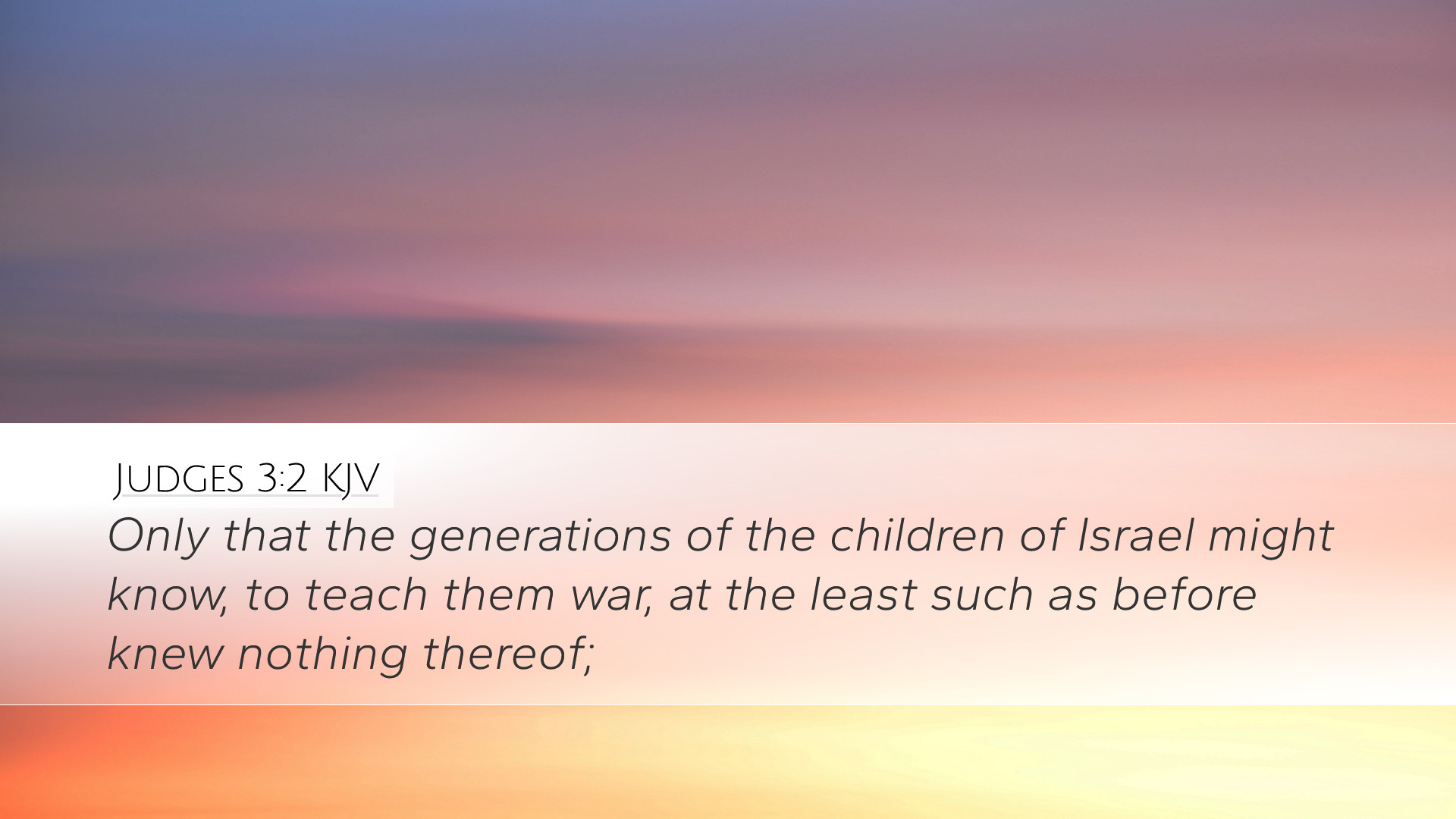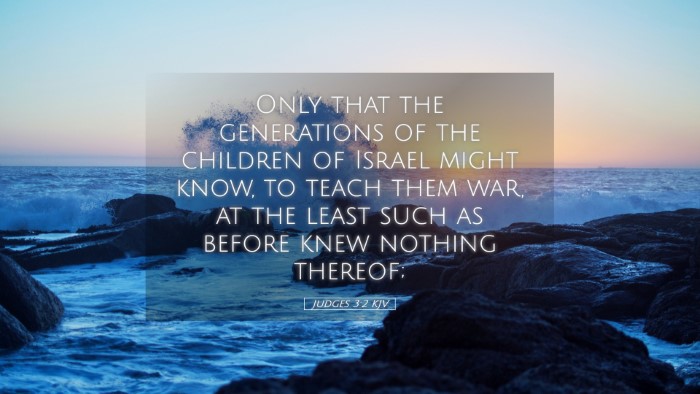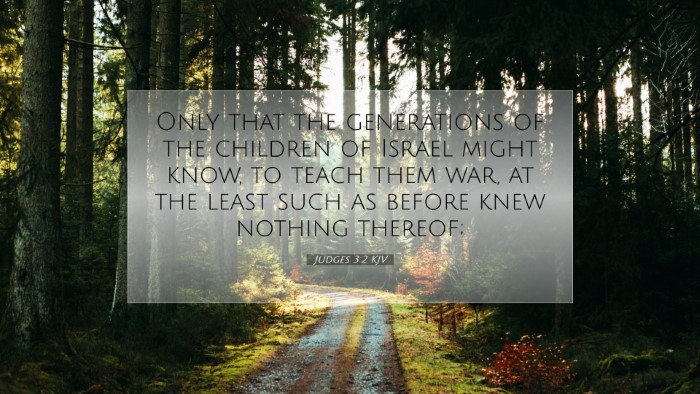Bible Commentary on Judges 3:2
Judges 3:2 (KJV): "And that the generations of the children of Israel might know, to teach them war, at the least such as before knew nothing thereof."
Introduction
This verse, nestled in the midst of Israel's cycle of sin, servitude, supplication, and salvation, serves as a crucial reminder of the spiritual and practical battles faced by God's people. The context of Judges not only frames the historical narrative but also provides profound theological insights suitable for pastors, students, and scholars alike.
Commentary Insights
Matthew Henry's Perspective
Matthew Henry points to the necessity of teaching the next generation about warfare, particularly in the spiritual context. He suggests that the mention of "those who knew nothing thereof" signifies a lack of experience not only in literal warfare but also in understanding the spiritual battles that lie ahead. He emphasizes that God does not merely desire passive followers but warriors trained in the ways of righteousness and equipped to battle sin and temptation.
Henry notes that the instruction in warfare serves a dual purpose: it prepares the children of Israel for physical battles against their enemies and symbolizes the greater spiritual conflict against evil. He underlines that ignorance in battle is a vulnerability, and knowledge is power in both the physical and spiritual realms.
Albert Barnes' Commentary
Albert Barnes elaborates on the educational aspect of this verse, pointing out that the generations of Israelites were not only to be aware of their enemies but also prepared to confront them. He views the "teaching of war" significantly as a metaphor for spiritual preparation. Barnes suggests that understanding the tactics and strategies of one's enemies is essential for victory.
He also asserts that God often uses trials and conflicts as teaching tools for His people. The trials faced in life are often meant to fortify one's faith and build resilience against future adversities. Barnes believes that it is through engagement with difficult circumstances that believers grow in understanding and strength.
Adam Clarke's Observations
Adam Clarke ties the historical context of Judges 3:2 to the broader narrative of Israel's covenant relationship with God. He recognizes that the Israelites’ battles were not mere military exploits but reflections of their spiritual state. Clarke argues that understanding the art of war is integral to the community's survival, as God had ordained that they engage in these conflicts to fulfill His promises.
Furthermore, Clarke points to the effectiveness of mentorship in passing down knowledge. This teaching emphasizes not only battle strategies but also the importance of courage, reliance on God, and adherence to His purposes. Clarke insists that the instruction in warfare is also a metaphor for teaching faith and reliance on divine strength against the forces of evil.
Theological Implications
Judges 3:2 invites a rich theological reflection on the nature of battle and preparation in the life of faith. Each commentator underscores that the struggle faced by the Israelites is analogous to the Christian journey. Here are some key theological implications:
- Preparation for Spiritual Warfare: This passage highlights the imperative for believers to be prepared for spiritual battles, drawing parallels between physical conflict and various spiritual challenges they may encounter.
- Generational Teaching: There is a significant emphasis on the transmission of knowledge and skills across generations. The need to teach the next generation about warfare also entails teaching them the history of God's faithfulness and victories.
- Divine Sovereignty in Conflict: God’s sovereignty is evident in how He uses these situations of conflict to accomplish His purposes, shaping His people into what He desires them to be.
- Dependence on Divine Guidance: The passage illustrates the importance of God’s guidance in decision-making and the necessity of a trained heart and mind to discern His ways.
Applications for Today's Believers
As pastors, students, theologians, and scholars reflect on Judges 3:2, several practical applications emerge:
- Equipping Communities: Church leaders are called to equip their congregations, not just with knowledge but also with skills necessary for battling contemporary spiritual challenges. This includes teaching discernment and resilience in faith.
- Mentorship Programs: The verse encourages establishing mentorship within the church where mature believers can teach younger generations about spiritual warfare, prayer, and reliance on God.
- Cultivating Awareness: Keeping believers aware of the reality of spiritual warfare is vital. Engaging them in discussions and teachings about the nature of their spiritual adversaries can foster a culture of vigilance and preparedness.
- Practicing Spiritual Disciplines: Just as physical warriors train, believers should involve themselves in spiritual disciplines such as prayer, fasting, Bible study, and fellowship as a means of honing their abilities to fight spiritual battles.
Conclusion
Judges 3:2 serves as a timely reminder of the importance of preparation—both physically and spiritually. The insights from Matthew Henry, Albert Barnes, and Adam Clarke converge to highlight the multifaceted nature of war as depicted in Scripture. Their commentaries provide profound reflections that encourage believers to equip themselves and one another for the challenges that lie ahead as they serve God in a world filled with conflict and opposition.


